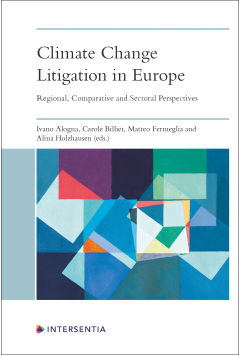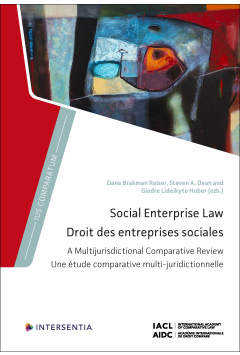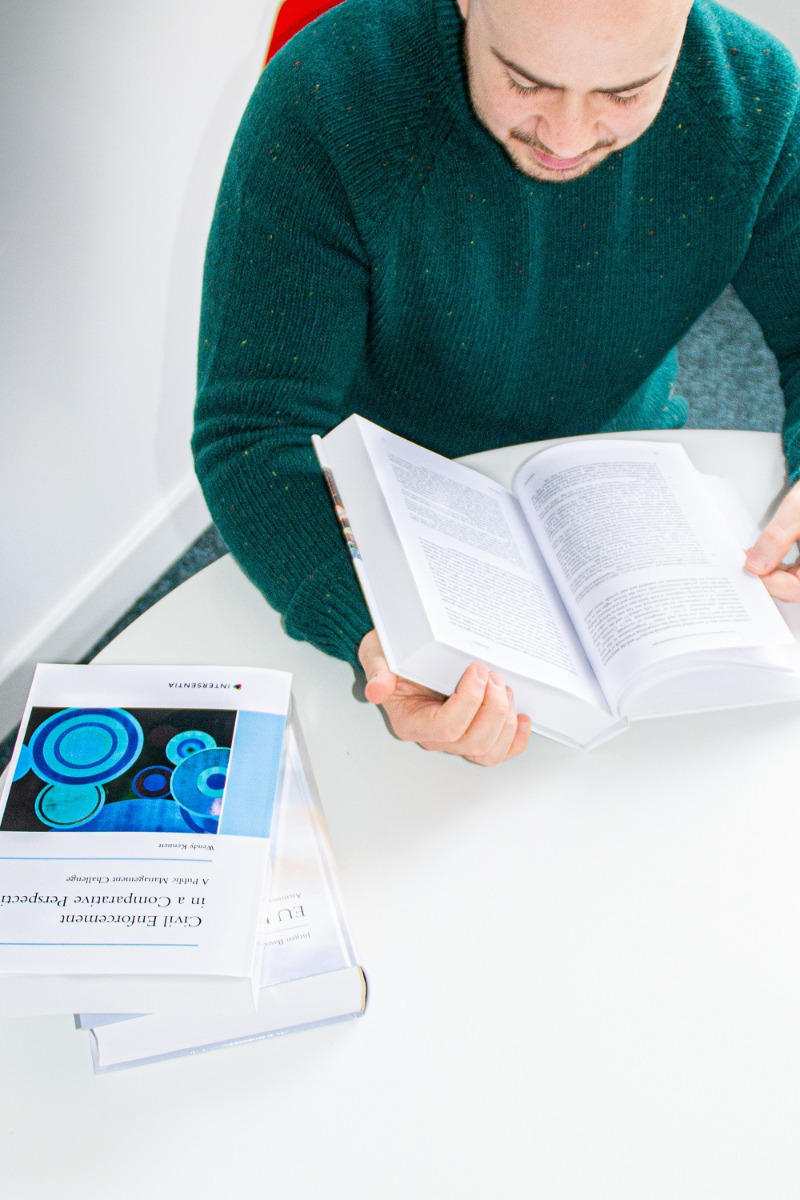Books, E-books and Journals
-
 Climate Change Litigation in EuropeRegional, Comparative and Sectoral PerspectivesBook | 1st edition 2024 | Europe, United Kingdom | Ivano Alogna, Carole Billet, Matteo Fermeglia, Alina Holzhausen€119.00 incl. VATAvailable shipped within 3-5 business days
Climate Change Litigation in EuropeRegional, Comparative and Sectoral PerspectivesBook | 1st edition 2024 | Europe, United Kingdom | Ivano Alogna, Carole Billet, Matteo Fermeglia, Alina Holzhausen€119.00 incl. VATAvailable shipped within 3-5 business days -
 European Yearbook on Human Rights 2023Book | 1st edition 2023 | Philip Czech, Lisa Heschl, Karin Lukas, Manfred Nowak, Gerd Oberleitner€199.00 incl. VATAvailable shipped within 3-5 business days
European Yearbook on Human Rights 2023Book | 1st edition 2023 | Philip Czech, Lisa Heschl, Karin Lukas, Manfred Nowak, Gerd Oberleitner€199.00 incl. VATAvailable shipped within 3-5 business days -
 The Road to Reconciliation?Optimizing the Legitimacy and Efficacy of The International Criminal Court within The African Union and AfricaBook | 1st edition 2023 | World | Ingrid Roestenburg-Morgan€115.00 incl. VATAvailable shipped within 3-5 business days
The Road to Reconciliation?Optimizing the Legitimacy and Efficacy of The International Criminal Court within The African Union and AfricaBook | 1st edition 2023 | World | Ingrid Roestenburg-Morgan€115.00 incl. VATAvailable shipped within 3-5 business days -
 Social Enterprise LawA Multijurisdictional Comparative ReviewBook | 1st edition 2023 | World | Dana Brakman Reiser, Steven A. Dean, Giedre Lideikyte Huber€199.00 incl. VATAvailable shipped within 3-5 business days
Social Enterprise LawA Multijurisdictional Comparative ReviewBook | 1st edition 2023 | World | Dana Brakman Reiser, Steven A. Dean, Giedre Lideikyte Huber€199.00 incl. VATAvailable shipped within 3-5 business days -
 Corporate Insolvency Law, 2nd editionA Comparative TextbookBook | 2nd edition 2023 | World | Reinhard Bork€95.00 incl. VATStudent price: €57.00Available shipped within 3-5 business days
Corporate Insolvency Law, 2nd editionA Comparative TextbookBook | 2nd edition 2023 | World | Reinhard Bork€95.00 incl. VATStudent price: €57.00Available shipped within 3-5 business days -
 The Justiciability of Economic, Social and Cultural RightsBook | 1st edition 2023 | World | Angelika Nussberger, David Landau€229.00 incl. VATAvailable shipped within 3-5 business days
The Justiciability of Economic, Social and Cultural RightsBook | 1st edition 2023 | World | Angelika Nussberger, David Landau€229.00 incl. VATAvailable shipped within 3-5 business days -
 Mass Harm in EuropeCompensation and Civil ProceduresBook | 1st edition 2023 | Europe | Tomas Arons, Rianka Rijnhout€169.00 incl. VATAvailable shipped within 3-5 business days
Mass Harm in EuropeCompensation and Civil ProceduresBook | 1st edition 2023 | Europe | Tomas Arons, Rianka Rijnhout€169.00 incl. VATAvailable shipped within 3-5 business days -
 International Survey of Family Law 2023Book | 1st edition 2023 | World | Robin Fretwell Wilson, June Carbone€115.00 incl. VATAvailable shipped within 3-5 business days
International Survey of Family Law 2023Book | 1st edition 2023 | World | Robin Fretwell Wilson, June Carbone€115.00 incl. VATAvailable shipped within 3-5 business days -
 The Crisis of Liberal DemocracyDiagnostics and TherapiesBook | 1st edition 2023 | World | George Katrougalos, Bertrand Mathieu€175.00 incl. VATAvailable shipped within 3-5 business days
The Crisis of Liberal DemocracyDiagnostics and TherapiesBook | 1st edition 2023 | World | George Katrougalos, Bertrand Mathieu€175.00 incl. VATAvailable shipped within 3-5 business days -
 The Power Distribution System Operator under EU, Belgian and Dutch LawBook | 1st edition 2023 | Europe | Simon Vanhove€130.00 incl. VATAvailable shipped within 3-5 business days
The Power Distribution System Operator under EU, Belgian and Dutch LawBook | 1st edition 2023 | Europe | Simon Vanhove€130.00 incl. VATAvailable shipped within 3-5 business days -
 European Sales LawChallenges in the 21st CenturyBook | 1st edition 2023 | Stefan Grundmann, Yesim M. Atamer€185.00 incl. VATAvailable shipped within 3-5 business days
European Sales LawChallenges in the 21st CenturyBook | 1st edition 2023 | Stefan Grundmann, Yesim M. Atamer€185.00 incl. VATAvailable shipped within 3-5 business days -
 Crypto-assets: the European Legal FrameworkBook | 2nd edition 2023 | Europe | Niels Vandezande€165.00 incl. VATAvailable shipped within 3-5 business days
Crypto-assets: the European Legal FrameworkBook | 2nd edition 2023 | Europe | Niels Vandezande€165.00 incl. VATAvailable shipped within 3-5 business days -
 Contractualisation of Civil LitigationBook | 1st edition 2023 | Anna Nylund, Antonio Cabral€195.00 incl. VATAvailable shipped within 3-5 business days
Contractualisation of Civil LitigationBook | 1st edition 2023 | Anna Nylund, Antonio Cabral€195.00 incl. VATAvailable shipped within 3-5 business days -
 Fiscal Policies to Mitigate Climate ChangeBook | 1st edition 2023 | World | Marilyne Sadowsky€198.00 incl. VATAvailable shipped within 3-5 business days
Fiscal Policies to Mitigate Climate ChangeBook | 1st edition 2023 | World | Marilyne Sadowsky€198.00 incl. VATAvailable shipped within 3-5 business days -
 Independence and Impartiality of International AdjudicatorsBook | 1st edition 2023 | World | Giuditta Cordero-Moss€230.00 incl. VATAvailable shipped within 3-5 business days
Independence and Impartiality of International AdjudicatorsBook | 1st edition 2023 | World | Giuditta Cordero-Moss€230.00 incl. VATAvailable shipped within 3-5 business days -
 Contemporary Challenges to the Teaching of Comparative LawCeremony of 16 May 2022 in Honour of 5 Great ComparatistsBook | 1st edition 2023 | Katharina Boele-Woelki, Diego P. Fernández Arroyo, Alexandre Senegacnik€68.00 incl. VATAvailable shipped within 3-5 business days
Contemporary Challenges to the Teaching of Comparative LawCeremony of 16 May 2022 in Honour of 5 Great ComparatistsBook | 1st edition 2023 | Katharina Boele-Woelki, Diego P. Fernández Arroyo, Alexandre Senegacnik€68.00 incl. VATAvailable shipped within 3-5 business days -
 Administrative SilenceBook | 1st edition 2023 | World | Pedro Aberastury€168.00 incl. VATAvailable shipped within 3-5 business days
Administrative SilenceBook | 1st edition 2023 | World | Pedro Aberastury€168.00 incl. VATAvailable shipped within 3-5 business days -
 Premature ObsolescenceIn Search of an Improved Legal FrameworkBook | 1st edition 2023 | Europe | Anaïs Michel€160.00 incl. VATAvailable shipped within 3-5 business days
Premature ObsolescenceIn Search of an Improved Legal FrameworkBook | 1st edition 2023 | Europe | Anaïs Michel€160.00 incl. VATAvailable shipped within 3-5 business days -
 The Right to Mental HealthA Human Rights ApproachBook | 1st edition 2023 | World | Natalie Abrokwa€105.00 incl. VATAvailable shipped within 3-5 business days
The Right to Mental HealthA Human Rights ApproachBook | 1st edition 2023 | World | Natalie Abrokwa€105.00 incl. VATAvailable shipped within 3-5 business days -
 Leaving, Entering, and Remaining: Seeking Asylum in an Extraterritorial WorldBook | 1st edition 2023 | World | Mary Dickson€90.00 incl. VATAvailable shipped within 3-5 business days
Leaving, Entering, and Remaining: Seeking Asylum in an Extraterritorial WorldBook | 1st edition 2023 | World | Mary Dickson€90.00 incl. VATAvailable shipped within 3-5 business days
Catalogue 2023
We are delighted to present our new and forthcoming publications in this 2023 catalogue.
We continue to publish a strong portfolio of books that explore topical issues and contribute meaningfully to their respective fields.
Browse the catalogue to find out more about the exciting projects we are working on!
Conferences
Larcier-Intersentia warmly invites you to come and meet us at the conferences, book fairs and other academic meetings, which will be attended throughout this year.
You will be able to review our latest publications and enjoy attractive discounts on all publications on display.
If you work on a script yourself, we would be very interested in exploring publishing opportunities with you as we always seek opportunities to expand our publishing program.
E-book collection
We have made over 200 books available digitally for both individuals and institutions.
Institutions can access our e-books via Cambridge University Press's academic digital publishing platform, Cambridge Core. Cambridge Core is the online home of over 34,000 academic books and over 370 journals.
Individuals can purchase individual e-books via our website.
New from IntersentiaOnline


Enterprise Foundation Law in a Comparative Perspective (Open Access)
Many large companies – like Bosch, Ikea and Novo-Nordisk – are owned by enterprise foundations. This book provides an overview of enterprise foundation law in six European countries and the US. The book explores enterprise foundation law in the seven aforementioned nations and analyzes how the law influences the prevalence and governance of enterprise foundations around the world.
IntersentiaOnline is a new online platform that provides instant access to quality law resources. By combining technology, publishing knowledge and expert authors, this platform can encompass resources that are quality-assured, topical and updateable. The platform includes both Open Access and paid for content, in a range of formats: articles, monographs, edited collections, model laws, case commentaries and more.
Interviews


Author Speaking | Lucia Elena Arantes Ferreira Bastos | Part 2
In this exclusive interview, we speak to Lucia Bastos about her book Transitional Justice in Brazil: Walking the Tightrope, published as part of Intersentia’s Series on Transitional Justice. The second part of this interview discusses human rights issues in Brazil, how the state has sought to correct these historical abuses and in what ways these policies must be adapted to carry out the goal of transitional justice. Read more.


European and International Law
We interviewed Laurence Burgorgue-Larsen on this recently published book. She discusses the meaning of “Plurality” and “Diversity,” and examines how these two legal and political concepts are affected by the burdens of the past: colonialism, war and the traditional attitudes of the countries addressed. Read more.


Author Speaking | Lucia Elena Arantes Ferreira Bastos | Part 1
In this exclusive interview, we interview Lucia Bastos about her book Transitional Justice in Brazil: Walking the Tightrope. The first part of this interview discusses the political history of Brazil and the cultural and legal implications of holding the past dictatorship to account. Read more.
1500 specialist and renowned authors at your service
Reliable payment partners


